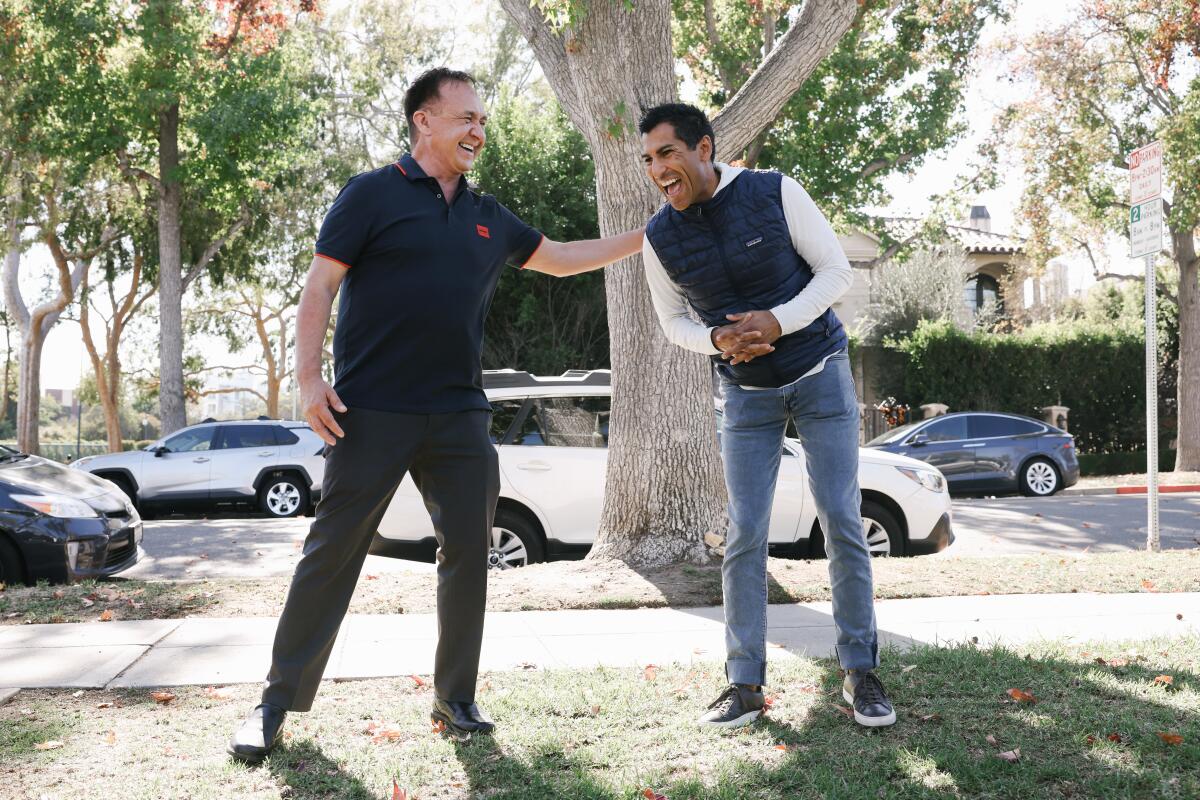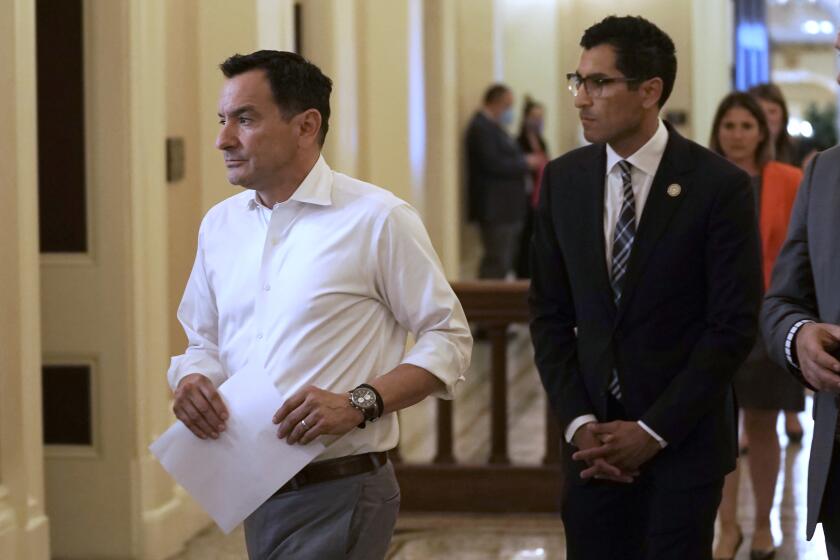Commentary: A fight for power in Sacramento tests boundaries of campaign finance law

- Share via
Twenty-two years ago, with frustration rumbling over the gusher of money in California politics, powerful state lawmakers convinced voters to embrace a major campaign finance reform. It limited the amount donors can give to individual candidates while making political parties the big-money brokers for state campaigns.
The idea was that the California Democratic and Republican parties would work with legislative leaders to decide which candidates to prioritize — and then pour on the dollars to help them win. And that’s more or less how it’s worked ever since.
But now, driven by smoldering discontent in Sacramento, a new generation of lawmakers is testing the boundaries of that law by going around their party and pooling their own campaign donations to spur a change in the Assembly speakership — one of the most powerful positions in California politics.
Assembly members are split over whether it’s time to replace Speaker Anthony Rendon, a Los Angeles County Democrat who’s held the post since 2016 — longer than anyone has since the 1990s. Vying to take his place is fellow Democrat, Assemblyman Robert Rivas from rural San Benito County. Rendon beat back a challenge from Rivas in an awkward standoff this spring, but a rematch looms. Two days after the Nov. 8 election, Democratic Assembly members will gather in Sacramento to vote for a leader.
The L.A. Times’ editorial board endorsements for statewide ballot measures, elected offices in Los Angeles city and county, L.A. Unified School District board, L.A. county superior court, statewide offices, the state Legislature and U.S. House and Senate seats.
The tension is over management style and personality more than policy or politics. Both Rivas and Rendon have support from a mix of moderates and progressives, and strong records voting for bills backed by labor unions and environmentalists.
Rendon’s leadership has been unusually hands-off, deferring important decisions to committee chairs and declining to put his name on legislation. The lack of direction has created chaos that irks some lawmakers. Rivas says his style would be more proactive. And because term limits allow him to serve up to eight more years (while Rendon is forced out in 2024), Rivas casts himself as a forward-looking leader.
At stake is the power to shape what becomes law in California and how the state spends some $300 billion a year. Speakership fights are usually secretive but this one is happening in public. Each man has consultants and PR professionals and a political operation to help elect Democrats to the Assembly.
This is where the unusual campaign finance maneuver comes into play. Rivas and 18 other Assembly members have put nearly $900,000 into a political action committee to elect people they hope will support Rivas for speaker. This “Democratic Leadership Coalition PAC” is buying mail ads to support 15 Assembly candidates, and Rivas has been traveling the state to stump for them.
With numerous state lawmakers resigning or running for other offices this year, legislative elections are more competitive than they’ve been in a long time.
Customarily, that job belongs to the current speaker, working with money from the California Democratic Party, some of which is donated by Democratic Assembly members. But lawmakers supporting Rivas feared Rendon would use money they give to the party to influence candidates to support him in the speaker’s race.
Rendon’s supporters see the PAC as evidence that Rivas is trying to buy votes. They point to the fact that the new PAC is spending most of its money to help candidates in seats Democrats are sure to win, and much less to support Democrats in swing districts.
And they are leery that Rivas is aligned with a network of wealthy donors, called Govern for California, that’s largely made up of Bay Area venture capitalists and philanthropists and is led by a former advisor to Gov. Arnold Schwarzenegger. Though its mission is to counter the influence public employee unions have in Sacramento, the network donates to legislators across the ideological spectrum — including labor-friendly progressives. It has donated heavily to Rivas, hired his brother, Rick Rivas, as a political advisor, and contributed to Rivas supporters in the speaker’s race.
Democrats who control the state Legislature demonstrated a stunning lack of leadership in managing an important gun safety bill.
Bill Wong, a Democratic political consultant and longtime Rendon ally, said the flow of money from “Govern for California” donors to Rivas supporters “puts our politics up for sale.”
But aren’t politics already up for sale? Plenty of billionaires also donate to the California Democratic Party, as do unions and corporations that lobby the lawmakers who will pick the next speaker. The party is spending six times more on Assembly races than the Rivas-aligned PAC has raised. And the biggest money of all in Assembly races is special-interest funded independent expenditures that don’t go directly to candidates, which at $44 million far outpaces the spending by the Democratic Party and the Rivas-aligned PAC combined.
Rendon said in a statement that raising money through the Democratic Party is the best way to help candidates because delegates vote at the annual convention on who should get the full party’s support.
The assemblyman who heads the Legislature’s tech caucus remains under investigation by California’s political ethics watchdog.
A provision of the campaign finance reform law that voters passed in 2000 says candidates cannot donate money to committees that make independent expenditures to support or oppose other candidates. But a California superior court judge ruled in 2014 that the provision is unconstitutional because the Supreme Court’s Citizens United decision gave groups broad rights to spend unlimited amounts on independent expenditure.
California’s political watchdog agency, the Fair Political Practices Commission, says the law still stands because it has not been repealed by the Legislature or overturned by an appellate court.
I asked Jessica Levinson, a professor at Loyola Law School with expertise in campaign finance law, what to make of the whole mess. A generation ago, she said, there was more optimism that campaign spending could be constrained by new laws but “now it’s just a free for all when it comes to money in politics.”
While it’s odd to see today’s legislators violating the rules their predecessors touted as “sensible campaign finance reform”, it seems reasonable that lawmakers who have lost faith in their leader should be able to set up their own channel for spending campaign money. The bigger question is how the divided Assembly will recover after such a deep loss of trust in its leadership.
More to Read
A cure for the common opinion
Get thought-provoking perspectives with our weekly newsletter.
You may occasionally receive promotional content from the Los Angeles Times.















